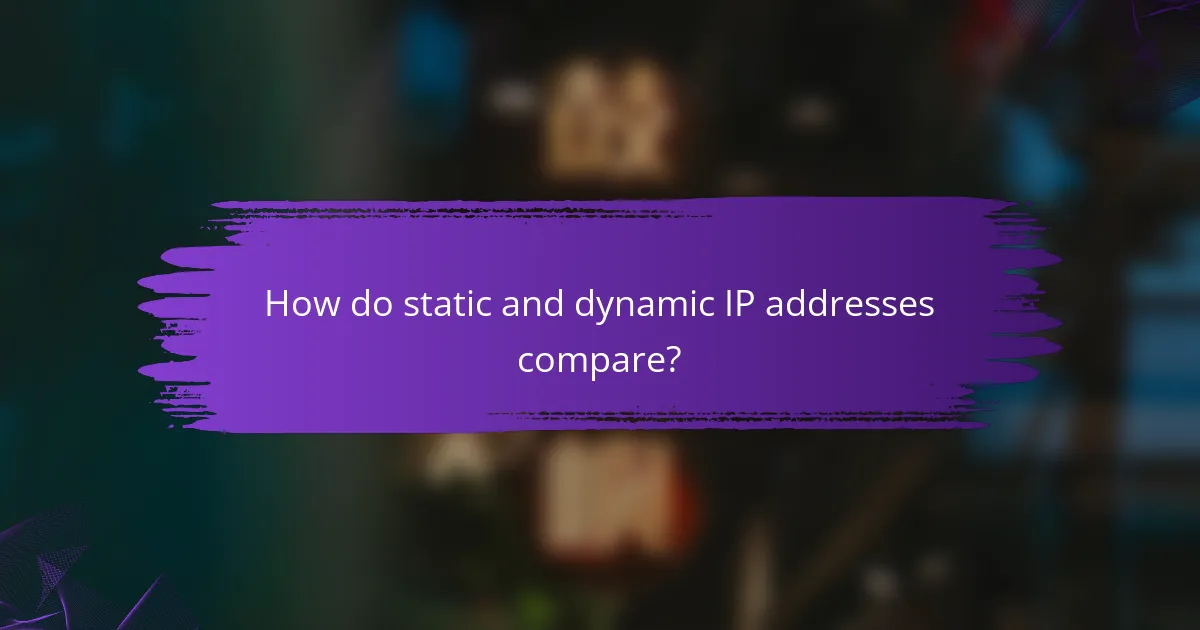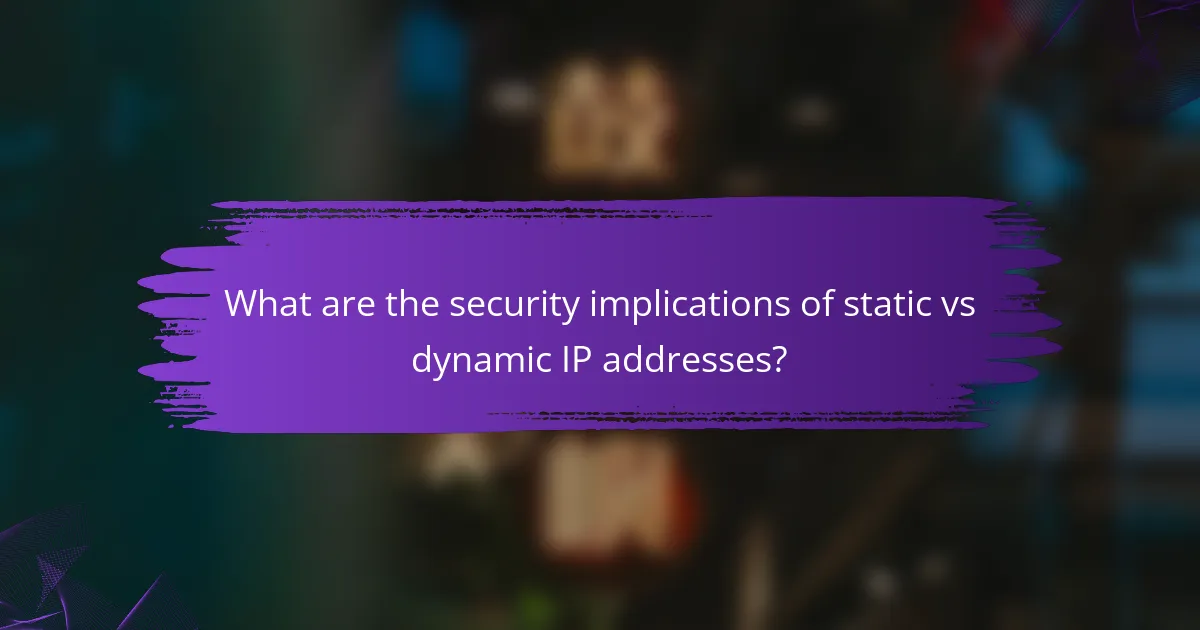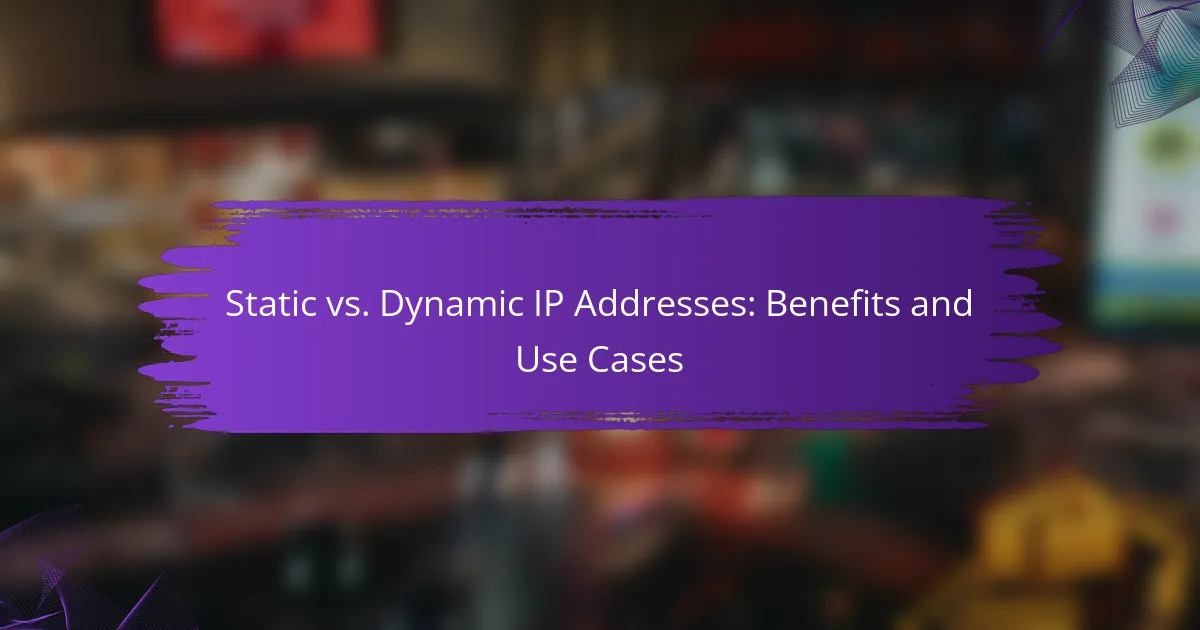Understanding the differences between static and dynamic IP addresses is crucial for optimizing network performance and security. Static IP addresses provide a fixed, unchanging address ideal for businesses that rely on consistent connectivity, while dynamic IP addresses offer flexibility and cost savings by changing periodically. Each type has its unique benefits and use cases, making them suitable for different networking needs.

What are the benefits of static IP addresses?
Static IP addresses offer several advantages, particularly for businesses and services that require consistent connectivity. They provide a fixed address that does not change, facilitating easier management and access for remote services and applications.
Consistent remote access
Static IP addresses enable reliable remote access to devices and servers. This is crucial for businesses that rely on remote work or need to access their systems from various locations. With a static IP, users can easily connect to their network without the need for constant reconfiguration.
For example, a company using a Virtual Private Network (VPN) can set up a static IP to ensure employees can connect securely from anywhere, maintaining a stable connection without interruptions.
Improved DNS reliability
Static IP addresses enhance Domain Name System (DNS) reliability by providing a consistent address for domain resolution. This stability reduces the chances of downtime, as the DNS records do not need frequent updates, which can lead to errors or delays.
In contrast, dynamic IP addresses can change frequently, requiring constant updates to DNS records. This can complicate website management and lead to potential accessibility issues for users trying to reach a site.
Better security for servers
Static IP addresses can improve security for servers by allowing for more precise firewall configurations. With a fixed address, network administrators can set up rules that specifically allow or block traffic based on the known IP, reducing the risk of unauthorized access.
Additionally, certain security protocols and services, such as IP whitelisting, work more effectively with static IPs. This can be particularly beneficial for businesses that handle sensitive data and require stringent security measures.

What are the benefits of dynamic IP addresses?
Dynamic IP addresses offer several advantages, including cost savings for Internet Service Providers (ISPs) and improved privacy for users. They are assigned temporarily and can change frequently, making them a flexible option for both providers and consumers.
Cost-effective for ISPs
Dynamic IP addresses reduce operational costs for ISPs by allowing them to allocate a limited number of IP addresses to a larger pool of customers. This means that they can serve more users without needing to acquire additional static IP addresses, which can be expensive and limited in availability.
By using dynamic addressing, ISPs can efficiently manage their resources and reduce the need for extensive infrastructure. This cost-effectiveness often translates to lower service fees for customers, making internet access more affordable.
Enhanced privacy for users
Dynamic IP addresses enhance user privacy by frequently changing the user’s IP address, making it harder for websites and online services to track individual users over time. This shifting nature of dynamic addresses helps to obscure a user’s online activities and location.
For individuals concerned about privacy, using a dynamic IP can be beneficial, especially when combined with other privacy measures. It is a useful option for those who want to minimize their digital footprint while browsing the internet.
Automatic IP address management
Dynamic IP addresses simplify the management of IP addresses for both users and ISPs. The Dynamic Host Configuration Protocol (DHCP) automates the assignment of IP addresses, ensuring that devices can connect to the network without manual configuration.
This automation reduces the chances of IP address conflicts and streamlines the process of connecting new devices. Users can easily connect to the internet without needing to worry about the technical details of IP address management.

When should you choose a static IP address?
A static IP address is ideal when you need a consistent and unchanging address for your devices. This is particularly important for services that require reliable connectivity, such as hosting websites or running servers.
For hosting websites
Choosing a static IP address for hosting websites ensures that your domain name consistently points to the same server. This reliability is crucial for search engine optimization and user accessibility, as visitors can always reach your site without interruptions.
Additionally, many web hosting services require a static IP for certain features, such as SSL certificates, which enhance security. Without a static IP, you may face challenges in maintaining a secure and professional online presence.
For running servers
Static IP addresses are essential for running servers, as they allow for uninterrupted access and easier management. For instance, if you are hosting a game server or a file server, a static IP ensures that users can connect without needing to update their connection settings frequently.
Moreover, static IPs simplify the configuration of network devices and services, such as firewalls and VPNs, which often require specific IP addresses for optimal performance. This stability can significantly reduce downtime and improve user experience.
For remote access applications
When using remote access applications, a static IP address facilitates consistent connections to devices or networks. This is particularly beneficial for businesses that rely on remote work, as employees can access company resources without the hassle of changing IP addresses.
Furthermore, many remote access tools, like Remote Desktop Protocol (RDP) or Virtual Private Networks (VPNs), perform better with static IPs. They provide a stable connection, reducing latency and connection issues that can arise with dynamic IP addresses.

When should you choose a dynamic IP address?
A dynamic IP address is ideal when you need flexibility and cost-effectiveness. It is automatically assigned by your Internet Service Provider (ISP) and changes periodically, making it suitable for various use cases.
For residential internet users
Residential internet users often benefit from dynamic IP addresses due to their affordability and ease of use. Most ISPs provide dynamic IPs as part of their standard packages, which helps keep costs low for households.
Additionally, dynamic IPs are sufficient for typical online activities such as browsing, streaming, and gaming. Since most residential users do not require a static address for hosting services, dynamic options are usually the best fit.
For mobile devices
Dynamic IP addresses are particularly advantageous for mobile devices, as they frequently connect to different networks. When switching between Wi-Fi and cellular data, a dynamic IP allows for seamless connectivity without the need for manual configuration.
This flexibility is essential for users who rely on mobile internet for navigation, social media, and other applications. The automatic reassignment of IPs helps maintain a stable connection while on the go.
For temporary connections
Dynamic IP addresses are ideal for temporary connections, such as those used in public Wi-Fi networks or during short-term projects. They allow for quick setup without the need for permanent configurations.
For example, if you set up a temporary office or event space, using dynamic IPs can simplify network management. Just ensure that the network security settings are robust to protect users accessing the internet through these temporary connections.

How do static and dynamic IP addresses compare?
Static IP addresses remain constant over time, while dynamic IP addresses change periodically. The choice between the two depends on specific needs, such as cost, use cases, and network management considerations.
Cost differences
Static IP addresses typically incur higher costs compared to dynamic IP addresses. Internet Service Providers (ISPs) often charge a premium for static IPs due to their fixed nature and the additional management required.
Dynamic IP addresses are usually included in standard internet service packages, making them a more economical choice for most residential users. Businesses may opt for static IPs despite the cost for the benefits they provide.
Use case scenarios
Static IP addresses are ideal for servers hosting websites, email services, or remote access applications, as they ensure consistent connectivity. They are also beneficial for businesses that require reliable access to their network resources.
Dynamic IP addresses are suitable for general internet browsing and home networks where constant connectivity is not critical. They work well for users who do not run servers or require remote access.
Network management implications
Static IP addresses simplify network management, as they allow for easier tracking and configuration of devices. They are particularly useful in environments where devices need to be consistently reachable.
Dynamic IP addresses can complicate network management due to their changing nature. Network administrators may need to implement additional tools for tracking and managing devices effectively, especially in larger networks.

What are the security implications of static vs dynamic IP addresses?
Static IP addresses can pose certain security risks due to their permanence, while dynamic IP addresses offer enhanced security through frequent changes. Understanding these implications is crucial for network management and protection against potential threats.
Static IP address vulnerabilities
Static IP addresses are easier for attackers to target since they remain constant over time. This predictability allows malicious actors to launch sustained attacks, such as DDoS (Distributed Denial of Service) attacks, more effectively.
Moreover, if a static IP is compromised, it can lead to unauthorized access to sensitive data or systems. Organizations using static IPs should implement robust security measures, including firewalls and intrusion detection systems, to mitigate these risks.
Dynamic IP address security advantages
Dynamic IP addresses change periodically, making it more challenging for attackers to track and target a specific device. This frequent alteration helps to obscure the network’s structure and limits the effectiveness of certain types of attacks.
Additionally, dynamic IPs can enhance privacy for users, as their online activities are less likely to be linked to a single, identifiable address. This is particularly beneficial for individuals and organizations that prioritize confidentiality and data protection.
